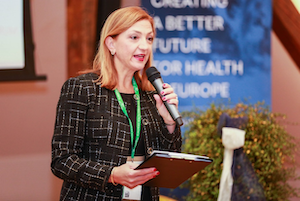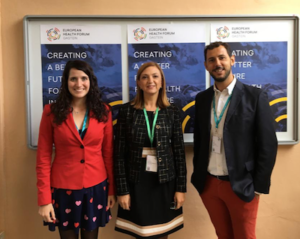Even though the World Health Organization (WHO) has declared that “immunization is one of modern medicine’s greatest success stories” with around 2 to 3 million deaths prevented every year, in 2019 WHO rated vaccine hesitancy as one of the 10 biggest threats to global health worldwide. The session on Vaccine Ecosystems Health Check was a stimulating thought-provoking discussion in which experts from different backgrounds discussed the complexity of the vaccine ecosystem, the challenges and the need for collaboration.
The moderator of the session, Natasha Azzopardi Muscat, president of the European Public Health Association (EUPHA), consultant in public health and senior lecturer at the University of Malta shared with us her experience and insights after the session.

Guido Maringhini (GM) and Raquel Medialdea-Carrera (RMC): Do you think that Public Health Professionals are doing enough to fight vaccine hesitancy?
Natasha Azzopardi Muscat (NAM): In general, I think that the Public Health Community did not wake up early enough to the whole issue of vaccine hesitancy and how vaccination patterns were changing. The increase in vaccine hesitancy was already well established when experts felt the need to put this on the agenda and take action. It was only when the recent measles outbreaks began that we started to say that “business as usual” is not going to work. Though, in fact, this had been building up slowly for years. So first and foremost, we, the public health professionals, have probably reacted too late.
Secondly, as part of their routine work, Public Health Professionals are often involved in many different aspects of vaccination including running immunisation programmes, designing them and doing cost-benefit analyses. However, one of the things that we probably do not do enough is to engage with some of our clinical colleagues who are very trusted by their patients such as general practitioners, nurses, pediatricians, geriatricians or pharmacists. Public Health Professionals are not working enough with these constituencies that can play such an important role to help to overcome vaccine hesitancy on a one-to-one basis.
That is what I call working downstream. Working upstream, I think in several countries many public health professionals have done wonderful work, even at great personal risk, engaging with the newspapers and social media to overcome vaccine hesitancy and working with faith leaders and other groups that are particularly resistant to vaccination.
GM & RMC: What else can Public Health Professionals do to fight vaccine hesitancy?
NAM: We can always do more. We can change the way in which we deliver the message. We can make the narrative more empathic, and we need to understand that those who do not vaccinate their children are not bad parents, but they are mostly misguided. Maybe, the question should not be what can we do more, but, instead, what can we do differently?
GM & RMC: Could you highlight some examples of good practice carried out in Europe to fight vaccine hesitancy?
NAM: For example, in Malta, the Association of Public Health Medicine (MAPHM) has just issued a statement on vaccination a couple of weeks ago. Also, the Italian Public Health Association (SItI) has done extensive work to raise awareness about the effect of changing the health law on vaccine coverage rates in many areas.
GM & RMC: In the next five to ten years, what do you think are going to be the main challenges that the vaccine ecosystem is going to be facing?
NAM: We need to recall that vaccine hesitancy is one manifestation of a broader social movement: anti-society, conspiracy theories, mistrust, misinformation, general sceptical questioning, etc. Thus, if this is going to continue to grow, then we will probably have a much bigger problem. It could take, for example, one scandal or one issue of corruption to bring the whole “house of cards” down.
On the other hand, the perception around vaccination may change if there are some really good breakthroughs with new vaccines, for example, against certain forms of cancer as we have recently seen with the HPV Cancer vaccine. Cancer is a disease that captures people’s emotions and imagination, and reframing vaccination as a preventive measure for these kinds of illnesses could perhaps bring a new life to the vaccination issue.
In terms of challenges within the vaccine ecosystem, if there are going to be more vaccines and if we are then able to change people’s perceptions and increase the demand, a series of processes need to be improved. We will need to make sure to have a good supply chain, that the vaccines are licensed and that they are truly accessible across all parts of the world. One group of countries that have difficulties accessing vaccines are the group of countries that get “stuck in-between”. Those countries that are not “poor enough” and thus do not get support to buy their vaccines, however, they can neither afford to buy these new vaccines. We have to avoid that kind of situation because if people know that there are these new vaccines being supplied in other countries but their health system does not afford them, they may start becoming sceptical.
GM & RMC: During the workshop today, we took part in a really interesting and engaging activity in which we played different roles within the vaccine environment in Europe. Do you think this type of interactive games can help to educate the public health community?
NAM: I’m always surprised by the extent to which a lot of people in the public health community still fail to grasp the essence – namely that public health is politics. Public health is not just science, it is the political layer on top of science and humanity. Thus, I find a lot of people who work in the area of vaccine-preventable diseases very concerned with getting the science right, however, they do not feel that it is also their role to be aware and involved in other aspects such as risk communication, procurement systems, the logistics, etc.. You cannot work as a Public Health Professional in the area of immunisation without getting involved in these other areas too. I think it was a good idea to just take some time out and play a game and learn lessons about the perspectives of the other players in this system and understand who you need to be talking to. It is not only about not understanding the other perspective; the problem is that we are often not even talking to the other players in the system because we all work on our “little island”.
Many thanks, Dr Natasha Azzopardi for your time and insights into the complexity of the vaccine ecosystem and the challenges of fighting vaccine hesitancy.

This interview was written by the Young Gasteiners Guido Maringhini and Raquel Medialdea-Carrera.
Published in GI-Mail 05/2020 (English edition).
- Do you already know our monthly newsletter GI-Mail with useful tips on postgraduate courses?
Sign up here. - Are you looking for vacancies or new career challenges? Here you will find the latest vacancies and job offers.
- Are you interested in up to date postgraduate courses and CME? In our education database »medicine & health« you will find new education events from over 2300 organizers.
